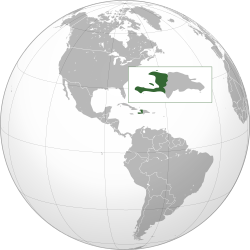From Wikipedia, the free encyclopedia
Haiti (pronounced /ˈheɪti/ (
Haiti's regional, historical, and ethnolinguistic position is unique for several reasons. It was the first independent nation in Latin America and the first black-led republic in the world when it gained independence as part of a successful slave rebellion in 1804.[5] Despite having common cultural links with its Hispano-Caribbean neighbors, Haiti is the only predominantly Francophone independent nation in the Americas. It is one of only two independent nations in the Americas (along with Canada) that designate French as an official language; the other French-speaking areas are all overseas départements, or collectivités, of France.
Haiti is the poorest country in the Americas as per the Human Development Index. It has experienced political violence throughout its history. Most recently, in February 2004, an armed rebellion forced the resignation and exile of previous President Jean-Bertrand Aristide, and a provisional government took control with security provided by the United Nations Stabilization Mission in Haiti (MINUSTAH). Rene Preval, the current president, was elected in the Haitian general election, 2006.
On January 12, 2010, a 7.0 magnitude earthquake struck Haiti and devastated the capital city, Port-au-Prince. Although the exact number was difficult to determine, an estimated 316,000 people were killed.[6] The Presidential palace, Parliament and many other important structures were destroyed, along with countless homes and businesses, leaving many homeless.
Please read here about how we became connected with an orphanage in Haiti through our home study agency. God has broken our hearts for the people of Haiti and shown us how beautiful and resilient they are.
And now-our two little girls are there!



